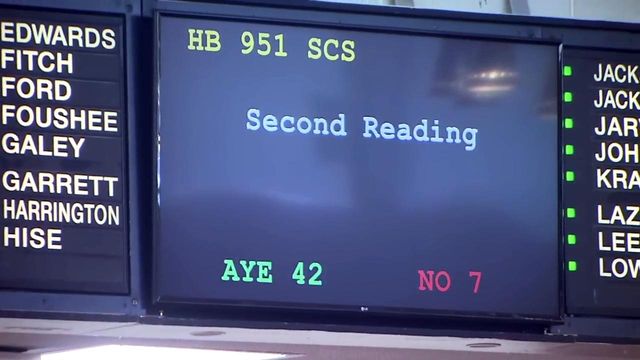Bipartisan support for energy bill as some worry over costs, 'ambiguities'
The energy bill, once a morass of controversy, is primed to pass this week with bipartisan support.
Posted — Updated"This legislation will require our [state] Utilities Commission to take the steps needed to get to a 70 percent carbon reduction by 2030 and to get to carbon neutral by 2050," Cooper said Wednesday, touting the bill at a national climate change meeting.
The bill doesn't lay out how Duke Energy, far and away the state's largest electricity producer, gets to that point, however. State regulators would work with the company on the lowest-cost plan to cut emissions, and Sen. Paul Newton, R-Cabarrus, a key bill supporter, said Tuesday the bill allows for delay past the measure's initial 2030 deadline.
“We’re giving them room to do the right thing at the right time," said Newton, a former Duke executive.
Cooper's administration negotiated the bill behind closed doors for months with Senate Republicans.
"We as a state are declaring what our country's most successful businesses already have: Our climate is changing, and we have the power to stop it," said Sen. Michael Garrett, D- Guilford.
In addition to the carbon targets, this bill overhauls the way North Carolina approves electricity rates, giving Duke some of the changes it has sought for years to an archaic regulatory system. Among other things, the bill allows for multi-year rate plans, letting the company seek North Carolina Utilities Commission approval for hikes of up to 4 percent per year over three years, instead of coming back repeatedly for lengthy public hearings to justify requests.
The measure also essentially shuts the door on talk North Carolina might move to a more competitive energy market, one where power generators bid prices and customers can pick the biggest bargain they find. That was never around the corner, but some lawmakers wanted the state to study such a move, something large energy customers backed.
Instead, the state's regulated monopoly structure will be reinvigorated. It has "served North Carolina for well over 100 years and can continue to do so," Newton said.
Some of the state's largest energy users, manufacturers represented by the Carolina Utility Customers Association, predict large price increases.
“We agree with all of your intent," CUCA Executive Director Kevin Martin told legislators Tuesday, as the bill moved through two Senate committees with limited debate and few questions from lawmakers.
"We expect to see large rate increases … both residential as well as manufacturing," Martin said. "We pray that we’re wrong with that, but when we’re not (wrong), we will all see, every 30 days, a friendly reminder from the utility."
Other business groups backed the bill, with the North Carolina Retail Merchants Association – another large electricity user – saying the bill “checks all the boxes for us" and has guard rails to keep Duke from overcharging. The North Carolina Chamber called the bill “the all-above choice that we need.”
Advocates for the poor shared their own cost concerns, saying lawmakers didn't write in enough protections for low-income families to cushion them on cost increases, not only from the rate-making regulatory changes, but from the cost of overhauling the state's power plants to replace carbon-belching coal with a to-be-determined mix of natural gas, nuclear power, solar energy and other renewables.
Al Ripley, with the North Carolina Justice Center, said there are too many loopholes in the bill that allow Duke to get around the targeted carbon cuts while still raising rates.
"It is not well crafted," Ripley said of the bill. "It's not going to deliver the carbon reductions that we need, and it's going to hurt many many low-income people and companies in our state. It makes no sense to me why the governor would support this."
Sen. Gladys Robinson, D-Guilford, said she voted against the bill because it doesn’t include assistance for low-income customers who already can’t afford to heat their homes.
"With this rate increase that we know all of us are going to have to absorb is going to be even more difficult, much more difficult for them," Robinson said.
Newton, who spent 25 years at Duke and retired as North Carolina president before joining the state Senate, said the bill has numerous consumer protections. He used the phrase "customer friendly" at least half a dozen times in describing the measure in committee on Tuesday and said it has the "most restrictive, customer friendly" multi-year rate plan in the country.
Appalachian Voices, an environmental and social justice advocacy group, pushed back against that in talking points it sent state lawmakers Wednesday, saying the bill "isn't even as good" as recommendations that came out of a study Cooper's administration released last year.
The group said this bill, "gives Duke tens of millions in extra profits each year, for no apparent reason."
The solar industry questioned some of the bill's language, with Carolinas Clean Energy Business Association lobbyist Alex Miller saying "there could be years of expensive” litigation to clear up "ambiguities" in the bill.
"But, ultimately, the bill still allows Duke Energy too much room to wiggle out of carbon reductions, and we can't squeeze our noses hard enough to support it," North Carolina League of Conservation Voters lobbyist Dan Crawford said in a statement. "It would allow Duke too much power to thwart our clean energy future and pad its profits at the expense of low-income communities and North Carolinians of color, and could give Duke veto power equal to that of the Utilities Commission."
Crawford said the group would include the bill in its 2021 legislative scorecard.
The Sierra Club said the multi-year rate-making section "creates the potential for Duke to make massive profits at customers’ expense." It called the carbon goals "respectable" but said the bill "falls short on protecting low-income ratepayers."
The Southern Environmental Law Center said the bill needs more vetting. The group said it supports the bill's top line goal on carbon cuts but remained "concerned that the current bill will not achieve those reductions."
NC WARN, often the state's most ardent environmental advocate, blasted the bill and the governor for supporting it, saying it "gives cover for the Charlotte-based corporate giant to continue its climate-wrecking expansion of gas-fired power plants."
"This bill is a profit-making scam and an affront to the North Carolina communities being harmed first and worst by hurricanes," NC WARN Executive Director Jim Warren said.
Related Topics
• Credits
Copyright 2024 by Capitol Broadcasting Company. All rights reserved. This material may not be published, broadcast, rewritten or redistributed.






